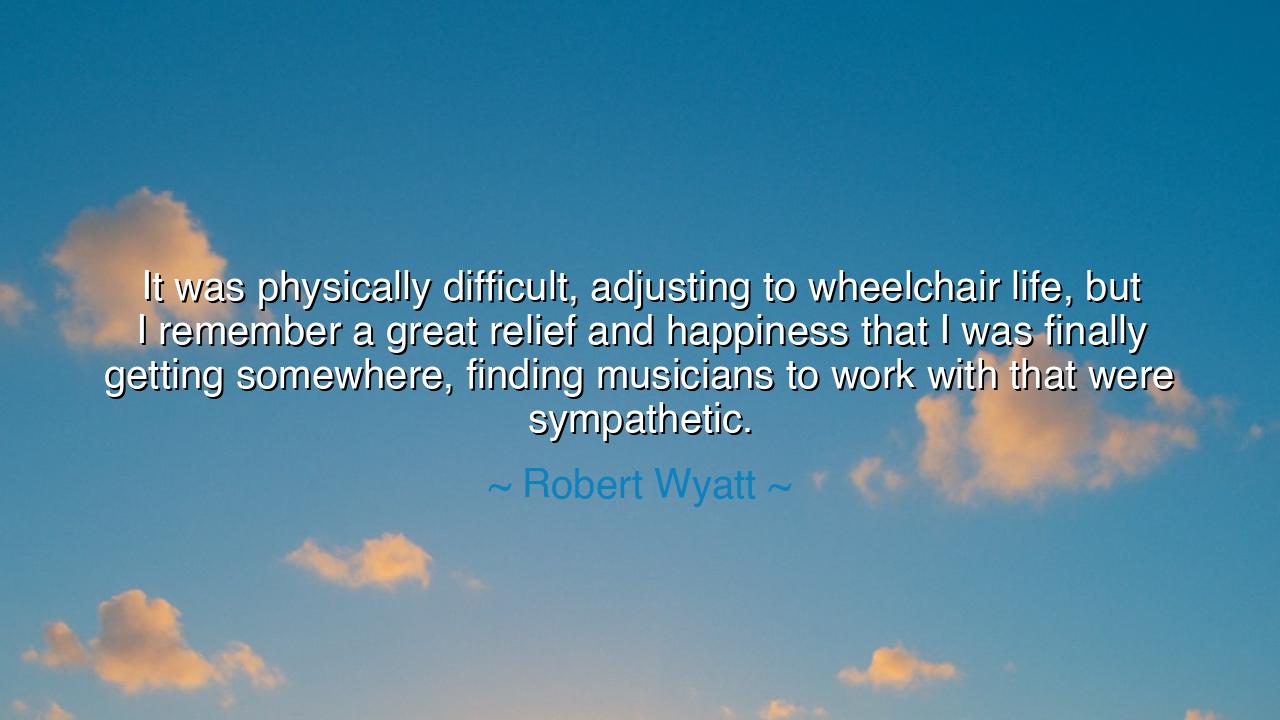
It was physically difficult, adjusting to wheelchair life, but I
It was physically difficult, adjusting to wheelchair life, but I remember a great relief and happiness that I was finally getting somewhere, finding musicians to work with that were sympathetic.






In the words of Robert Wyatt, “It was physically difficult, adjusting to wheelchair life, but I remember a great relief and happiness that I was finally getting somewhere, finding musicians to work with that were sympathetic,” we hear a voice not merely of endurance, but of transformation. These words are born not from comfort, but from pain — from the quiet heroism of a man who turned tragedy into creation. Wyatt, once the drummer of the famed progressive rock band Soft Machine, suffered a life-altering accident in 1973 that left him paralyzed from the waist down. Yet out of that darkness, he found not despair, but a deeper kind of relief — a freedom not of the body, but of the soul. His words carry the weight of one who has learned that even when life takes away one form of motion, it offers another — the motion of spirit, the stillness that leads to understanding.
The origin of this quote lies in Wyatt’s rebirth as an artist. Before his accident, he was a man of restless energy — a drummer who lived through rhythm, movement, and speed. The fall that broke his body could have broken his will. Yet, in the stillness of his new life, he began to see differently. He turned from drums to voice, from rhythm to reflection, and discovered that what he had lost in motion, he gained in meaning. When he speaks of finding “musicians that were sympathetic,” he does not mean pity, but empathy — kindred souls who understood that true music is not in the hands, but in the heart. It was in this fellowship, this communion of understanding, that he found his happiness again.
His words remind us of an eternal truth — that the human spirit is not measured by what it can do, but by how it responds when it can do no more. The ancients told of Hephaestus, the Greek god of fire and the forge, who was cast from Olympus because of his deformity. Lame and broken, he nevertheless became the divine craftsman, fashioning wonders even the gods envied — thunderbolts for Zeus, armor for Achilles. Like Wyatt, Hephaestus turned limitation into creation, pain into power, silence into song. The lesson of both is clear: the body may falter, but the creative fire, once kindled, cannot be extinguished.
Wyatt’s relief came not from forgetting his suffering, but from accepting it. There is a sacred peace that arises when one stops fighting what cannot be changed and begins instead to shape it into meaning. In that moment, weakness becomes wisdom. He discovered that his music no longer needed to be loud or fast — it could be tender, introspective, alive with vulnerability. His voice, soft yet full of depth, became his new instrument, carrying truths that no drumbeat could contain. Thus, his art did not die in tragedy; it was reborn through compassion — for himself, for others, for the frailty of the human condition.
There is something profoundly spiritual in this journey. In every life, there comes a time when the path narrows, when the limbs fail or the world changes beyond recognition. Many rage against this, mourning what was lost. But a few — the wise, the brave, the artists of the soul — learn to adapt, to listen, to find new ways to move within stillness. Wyatt’s words are a hymn to this quiet strength. The happiness he speaks of is not the shallow kind that comes from pleasure, but the deep joy of finding purpose amid pain. It is the joy of creation, the joy of connection, the joy of knowing that though life has changed, it still sings.
Let us remember this: Sympathy, as Wyatt found, is the bridge between brokenness and healing. No one heals alone. Just as he found musicians who understood his rhythm of recovery, so too must we surround ourselves with those who uplift, who listen, who remind us that our worth is not in what we can do, but in who we are. The soul thrives not in solitude, but in shared understanding.
So, take this as the lesson of Wyatt’s life and words — that when life shatters your old form, do not cling to the fragments. Transform. When your old music fades, listen for the new melody that rises from within. Seek out those who will help you play it, not with pity, but with shared courage. And when you find that inner harmony — between acceptance and aspiration, sorrow and joy — you will know what Wyatt knew: that happiness, even in limitation, is not the absence of pain, but the presence of purpose.
For in the stillness of the body, the spirit may finally learn to sing — and in that song, we find the eternal art of becoming whole again.






AAdministratorAdministrator
Welcome, honored guests. Please leave a comment, we will respond soon